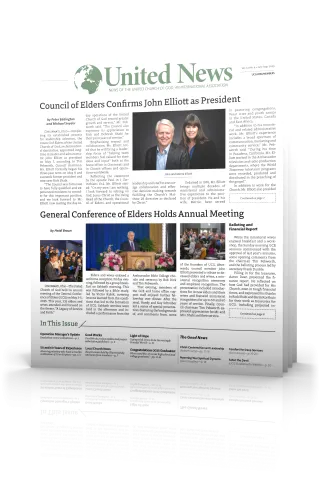Comfort for Deep Sorrows

The Bible has many wonderful scriptures about how God comforts us and wants us to comfort one another.
We who understand God’s plan of salvation do not “sorrow as others who have no hope” (1 Thessalonians 4:13). We know that Jesus Christ will return to earth, resurrect the saints, give them glorious eternal life in His Kingdom, and will later resurrect all the rest of the dead in the second resurrection. This knowledge gives us great comfort!
Yet, we also experience times of intense sadness. Most of us and our families and friends will suffer heartbreaking grief. Some grief is relatively short-lived, while some grief remains for all of one’s life.
We all eventually have the heartbreaking experience of losing a dear loved one. To “lose” a loved one usually means a death. But we need to be conscious of the fact that there are many types and degrees of personal “losses.” First, we need to be spiritually and mentally prepared for our own losses. And we need to be prepared and dedicated to lovingly comfort and help others when they suffer losses.
This article has two main purposes. One is to give added understanding and comfort to the brokenhearted, and the other is helping everyone to better know how to help those who are grieving.
Refuting some harmful beliefs
First, let’s dispel a terrible superstition that has persisted since the beginning of time. It is the idea that suffering is often a curse inflicted from God. Of course, God sometimes lovingly disciplines His children to steer us back to the right path (Hebrews 12:5-11). But please know that if God decides to discipline you, He will not do it by hurting one of your loved ones.
Much of what happens, even to God’s people, is simply the result of physical cause and effect, such as the consequences of people’s mistakes and “time and chance” (Ecclesiastes 9:11-12).
This myth is a major reason why many people have been so hard-hearted toward others. Jesus
hated this mindset. See how Jesus refuted the harmful myth in Luke 13:1-5. He also shocked the populace by His example of showing as much love and even extra love toward the people neglected and rejected by that society—those suffering with leprosy, handicaps, injuries, sicknesses, poverty and premature family deaths.
Another tragic idea
Another tragic thought is that God must not be both all-loving and all-powerful because He didn’t prevent a personal calamity. In fact, some of our members have left the Church because they felt disillusioned or abandoned by God as a result of a family tragedy. This is a tragic reaction. We pray that they will overcome their misunderstandings and gain a closer-than-ever relationship with God!
For a much more thorough understanding of this subject, please read our UCG study aid, Why Does God Allow Suffering?
Be spiritually prepared for bad things
People often make the mistake of not praying for guidance, help and protection because they just naively assume that all will go well. Instead, we should assume that problems are much more likely if we neglect to pray or neglect to obey God. Be conscious of the fact that we are surrounded by countless dangers. The worst danger is the powerful influence of Satan and the demons!
In fact, Bible prophecy warns us that, in the end time, there will be a devastating increase in deceptions, deaths, health problems, persecution, betrayals and all kinds of chaos and tribulations. The Bible urges us to be spiritually prepared so we won’t panic or feel disillusioned, as we see in John 16:1-4; 2 Timothy 3:12-17; Acts 14:22.
Keep in mind that God has never promised paradise or a trouble-free experience in this life. We must keep our focus on being zealously faithful to God so we will experience paradise in the next life!
God dearly loves us!
The Bible is God’s love letter to mankind. The more we read and understand it, the more we will see the proof of God’s amazing grace and love for all people. God is “not willing that any should perish” and He “desires all men to be saved” (2 Peter 3:9; 1 Timothy 2:4).
God and Jesus understand us and empathize with us because Jesus experienced all kinds of suffering during His earthly life. And He endured all of that for our benefit! Please see the recent Beyond Today article, “Three Levels of Jesus Christ’s Great Sacrifice.”
Many heartbreaking ways to lose a love one
Losing a loved one is often utterly heartbreaking and devastating even if you are close to God. Even the Bible calls death an “enemy” (1 Corinthians 15:26). Thankfully, the Bible also reveals the good news of how that enemy will be destroyed by the resurrection from the dead (verses 20-28).
A sudden death is devastating and a long, painful decline in health leading to death is also devastating.
When a couple has been married for many years and one of them dies, the survivor often suffers greatly. That couple has spent a lifetime being partners and “one flesh,” so the widow or widower feels like one half is missing!
When someone who is relatively young dies, that seems especially tragic. All parents have a passionate desire for their children to greatly outlive them, so consider the agony of losing a child. The loss is usually devastating, whether the child was a baby, a young child, a teenager or an adult. Similarly, there is often great sorrow after losing a beloved parent, grandparent, sibling, uncle, aunt, niece or nephew.
Death is certainly not the only “enemy.” Serious diseases, injuries and handicaps are also enemies. Another is seeing a loved one suffering dementia with decreasing mental and physical abilities. Another is the physical separation when one must live in a nursing home.
There are other heartbreaking family tragedies. Physical and mental abuse. Abuse of alcohol or drugs. Various addictions. Marital breakups and divorces. Religious hostility and persecution. Even long-term alienation over differing political views. Those who suffer from these situations certainly need our prayers!
Think of the caregiver of a loved one. Personal caregiving is a big subject, deserving of a separate article. The point here is that, even though most family caregivers are lovingly dedicated to their roles, caring for a suffering loved one day after day is often stressful and heartbreaking.
Clearly, there are all kinds of heartbreaking experiences in this mortal life. When one has suffered a loss or crisis, it is of course essential to make practical adjustments in one’s life. Furthermore, it is extremely important for everyone to actively grieve and mourn for a time. In fact, serious grief often never ends. It diminishes overall, but there are many ups and downs. Thankfully, there are many helpful books and websites that explain the important benefits and processes of grieving.
What should we do?
How can we help? This article has provided some ideas. We can nurture closer relationships with our family members and friends. Then we can better understand each other. And we can ask God to guide us as to how we can best encourage, comfort and help them.
Those who suffer a serious loss often immediately receive many cards and other expressions of sympathy. In addition, let’s try to remember to
occasionally open the door of reminiscing together to share happy and sad memories of the past. This can be very comforting.
A grieving person benefits significantly when a family member or friend expresses his or her love and comfort by not only offering practical assistance, but also grieving along with them. That is what Paul meant in Romans 12:15 when he wrote, “weep with those who weep.” For a more thorough understanding of grieving together, we refer you to a reprinted article of that title, “Weep With Those Who Weep.”
The Bible has many wonderful scriptures about how God comforts us and wants us to comfort one another. Let’s end with this one: “Blessed be the God and Father of our Lord Jesus Christ, the Father of mercies and God of all comfort, who comforts us in all our tribulation, that we may be able to comfort those who are in any trouble, with the comfort with which we ourselves are comforted by God” (2 Corinthians 1:3-4).







